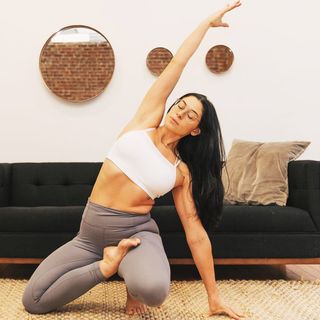I Became a Minimalist to Help Curb My Anxiety
What does it really mean to let go? When we turned this question over to our editors and readers, their responses proved that grief, catharsis, and rebirth come in all forms—whether it’s finally moving on from a failed relationship, rebuilding oneself after a painful trauma, or quietly saying goodbye to the person you once were. Our series Letting Go highlights these compelling and complicated stories. Below, yogi and fitness expert Claire Fountain makes the connection between clutter and anxiety—and offers her advice for letting go of the physical to make space for well-being.

I have always believed clutter gave me anxiety—physical items, noises, moving parts. It felt like a manifestation of chaos in the form of stuff and external factors that compounded what was going on inside of me. When we are surrounded by excessive clutter, it is usually a reflection of how we feel on the inside or could affect how we feel inside.
Thankfully, I grew up in a home where altruism was the norm, and we were brought up to give back as much as we could. As an adult, I clean out often. In mass amounts when I’m moving or the seasons are changing and almost weekly now as I try to keep my NYC apartment streamlined. An excess of “stuff” means little to me, and I worry we are becoming obsessed with “things” and not qualities, life experiences, and personal interactions.
Cleaning out is not only good for those you can donate to, but it is a practice in letting go of that which no longer serves us. It gives us the space to be free from the worries we have around “stuff” and the feelings we have attached to “stuff.” From the practical side of having a cleaner space, you will most likely also have a cleaner mind, and what better way to find more happiness and more joy than a clear mind? Sometimes the stuff we hold onto is the very stuff holding us back.
Though minimalism falls into a special place for me, I have a realist’s approach to minimalism. There is a balance of how to live a life that is simple but not extreme. The solution to clutter is not obsessive rigidity (an issue in itself.) For me, I think about calm. How can I create a space of calm for myself? How can I allow space for what I’d like to manifest internally and externally? What does peace look like in a home?
For me, it’s:
1. Getting rid of things I don’t need by giving them away or tossing them out.
2. Finding silence or using a noise machine at night since I do live a city.
3. Creating space to walk or move easily in my domestic area for personal ease and for energy to flow easily.
4. Moving items or even furniture that serves no function or purpose.
5. Streamlining beauty and skincare even when in a sea of products.
I also think that so much of what matters to us lives in the heart. Experiences mean more and live in our memory through photos, food, scents, and many other factors that aren’t necessarily things. I also think that cleaning out allows us a powerful tool for better mental health: giving to others.
Calm is a superpower—one I hope to achieve by maintaining a space that is easy to live in, allows for everything I need (not just everything I want), and doesn’t trigger anxiety or chaos.

Disclaimer
This article is provided for informational purposes only and is not intended to be used in the place of advice of your physician or other medical professionals. You should always consult with your doctor or healthcare provider first with any health-related questions.